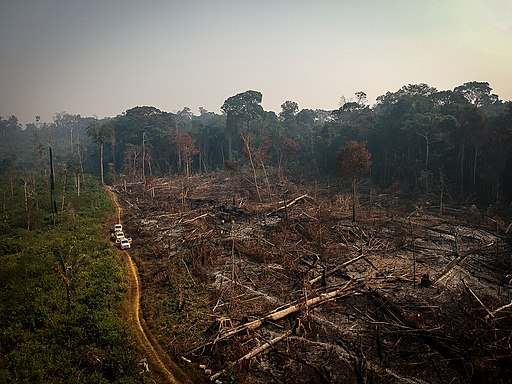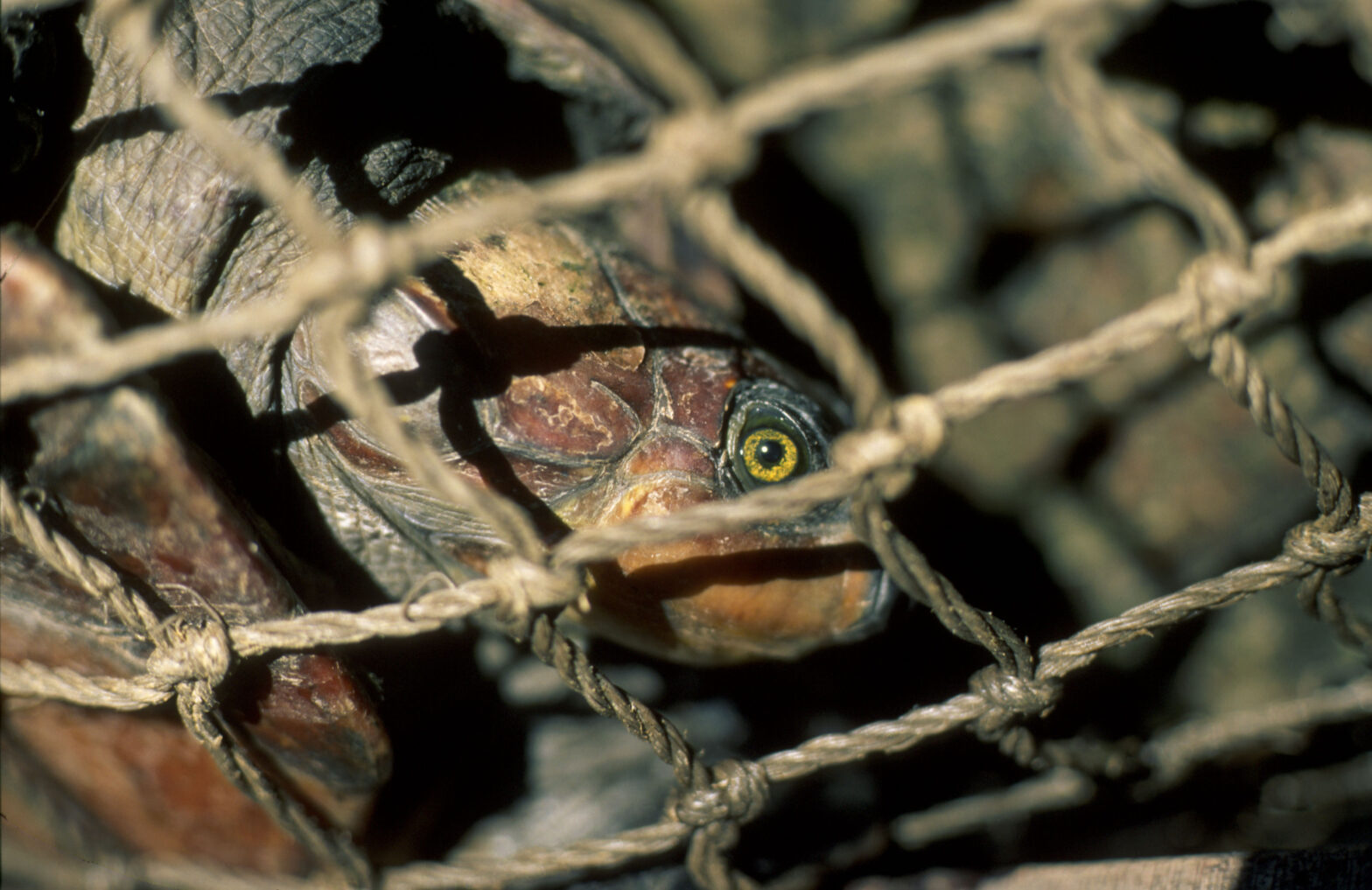
Woman Babassu Nutcrackers work in the community of Sumaúma. Photo: Gabriele Roza/InfoAmazonia
Seated on the floor of a hut, seven women break babassu nuts open: crack, crack, crack… The echoes of their sticks punctuate life in Sumaúma, a rural community framed by green hills in Sítio Novo, Tocantins State. Babassu nutcrackers open the husks and pick out handfuls of nuts holding the embryos of future palm trees. Small and breast-shaped, they have a nipple-like knob at their tips. Their husks are used to produce charcoal; oils and milk are extracted from the nuts; the inner pulp (known as the mesocarp) is ground into nutritious flour for breads, cakes, and vitamin supplements. Finally, the leaves of these palms are woven into roofs for homes, and shaped into local handicrafts.
These Indigenous women and descendants of runaway African slaves living in quilombo settlements are battling for the right to preserve this tradition. Ensuring their livelihood and their ancestral culture extend beyond just cracking babassu nuts. During the past four decades, they have drafted and proposed laws protecting agro-extractivism and their activities. With legal support, they have drafted more than ten bills presented to legislators since 1997. So far, at least eighteen municipal and two state laws have been passed, with at least five ongoing projects striving to ensure the right of access to babassu groves for these women.
This group was initially set up in 1991 as the Women Babassu Nutcrackers Articulation (Articulação das Mulheres Quebradeiras de Coco Babaçu) at an interstate meeting of women babassu nutcrackers in São Luís, Maranhão State. The Interstate Women Babassu Nutcrackers Movement (MIQCB – Movimento Interestadual das Quebradeiras de Coco Babaçu) was officially set up in 1995.
“A milestone for the MIQCB is the acceptance of the Babassu Access Act (Lei Babaçu Livre) by some states and municipalities, allowing babassu nut extraction and the right to its use as a community-held natural resource that cannot be privatized. While other rural movements and traditional communities in Brazil focus on territorial recognition, particularly indigenous peoples, nutcracker communities have been urging agro-ecological babassu nut extractivism, with legal constraints on felling these palms,” explains, anthropologist Aurélio Vianna, coordinator of the Tenure Facility Foundation, which is associated with the MIQCB movement.
So far, the Babassu Access Act (Lei Babaçu Livre) has been implemented in Piauí, Tocantins, and Maranhão States. In the latter, this law ensures the right to enter only public land, rather than privately held property. There are eighteen municipalities where this law has been approved, with its adoption underway in two others.
In Tocantins State, “if women babassu nutcrackers are unable to access private land to harvest babassu nuts, they can file a complaint with the Civil Police,” said Carlos Geovanne Pinheiro Santos, Executive Environment Secretary for São Miguel do Tocantins Municipality. ”Generally, the Environmental Military Police takes action by going to the rancher’s property and advising him of these nutcracker rights, confirming the support provided by state law,” he explains. For more serious crimes, such as severe threats, physical violence, or other aggravating factors, the matter is referred to other institutions, such as the Prosecutor’s Office.





Aurélio Vianna notes that the struggle of these women babassu nutcrackers to ensure access to natural resources may be compared to legislation protecting water and minerals, each with their own extraction and usage laws, and regardless of their locations: “They are common assets, but not general community assets. They are assets held by people whose livelihoods depend on them, and this is related to culture”, says this researcher. ”This milestone act asserts a right that is often not seen as valid for existing private properties, so this is a major innovation,” he adds.
On paper, the laws assure these women the right to collect babassu nuts wherever they grow naturally. But, in practice, this legal guarantee runs up against locked ranch gates and sometimes electrified fences too. In more severe cases, nutcrackers may even be threatened. Effective law enforcement depends heavily on the location, local authorities, and ranch owners.
In addition to being a nutcracker with five granddaughters, Maria Ednalva Ribeiro da Silva is one of the Movement’s representatives on the National Traditional Peoples and Communities Council (Conselho Nacional de Povos e Comunidades Tradicionais) in Brasilia. She travels from her upstate home in São Miguel do Tocantins to the Brazilian capital about six times a year, to discuss agrarian and environmental proposals to be included in public policies for women babassu nutcrackers. ”Today, we are talking about accessing the nuts and protecting babassu groves from a socio-environmental law standpoint,” she explains.
In Tocantins State, where she lives, the Babassu Access Act was approved at the State level and in four municipalities (São Miguel do Tocantins, Praia Norte, Buriti, and Axixá). Nevertheless, barriers to collecting these nuts remain high: “I have been threatened by large-scale rural landowners,” she recalls.

Things were better in the past, because there wasn’t so much poison around. Today there’s a lot of poison in the soil and in the palms too.
Maria Ednalva Ribeiro da Silva, babassu nutcracker.
“Things were better in the past, because there wasn’t so much poison around. Today there’s a lot of poison in the soil and in the palms too,” she explains. Underscoring the use of pesticides around babassu groves, she notes that this steps up the need for “thorough washing to remove poisonous residues.”
Before the MIQCB was set up, Maria Ednalva was engaged in a historic struggle: trade union training for rural laborers in the 1980s. ”One night, I was coming home after bringing food to my husband who worked in the fields, and a woman from the Land Pastoral Commission (Comissão Pastoral da Terra) knocked on my door and said she wanted to talk to us so we could organize into a workers’ union,” she recalls.
By the 1990s, the history of Brazil was changing. ”At that time, struggles in land conflicts and unions were strengthened. In 1997, the first initiative proposing a federal law ensuring free access to babassu palms was presented to the Brazilian Congress.
“Having a single law throughout Brazil is one of the goals of the Women Babassu Nutcrackers Movement. The biggest hurdle so far has been the Lower House, which claims it cannot impose conditions on private landowners that allow nutcrackers to collect nuts on their ranches,” explains lawyer and MIQCB advisor Renata dos Reis Cordeiro.
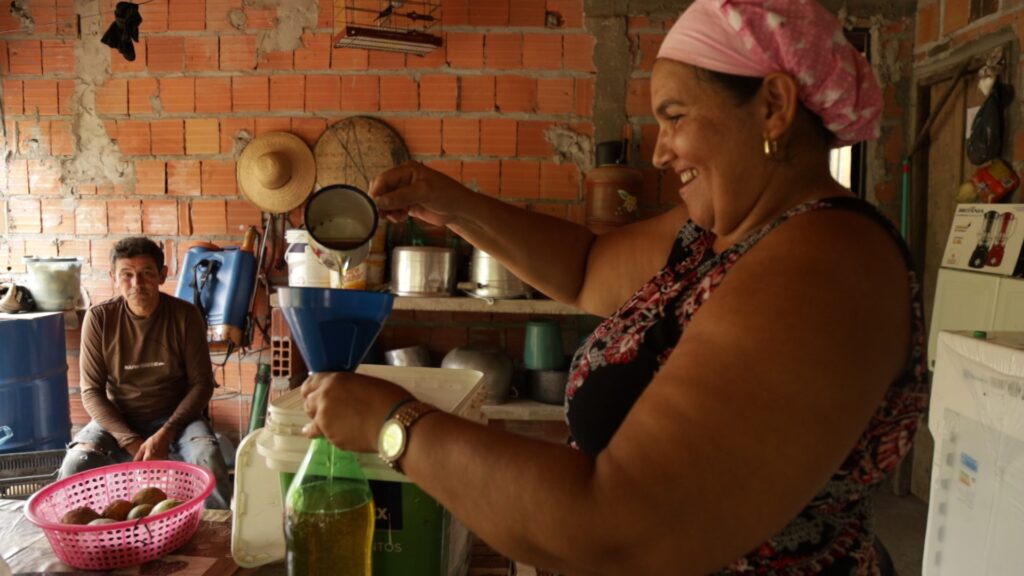
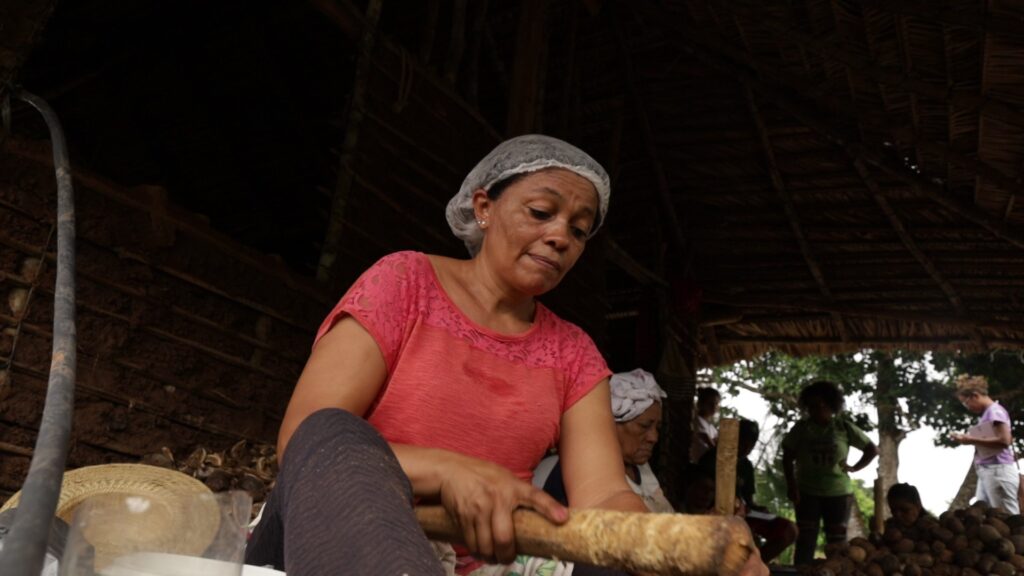
In 2022, this movement achieved an extraordinary victory. A version of this Act (Lei Nº 7,888/2022) was approved in Piauí State, acknowledging babassu nutcracking communities as a traditional people with their own way of life. The State Governor at that time was also a nutcracker – Regina Souza (PT – Workers’ Party) and supported the legislative agenda of these women. During her nine months in office (she was the Deputy Governor), she steered this draft bill through the Piauí State Legislative Assembly.
“Under this law, agro-ecological extraction activities are considered a cultural heritage. From them derive other rights, such as free access to babassu nuts and the possibility of granting them land titles,” concludes Cordeiro.
The Act was published on December 9, 2022, with wording that encompasses concepts such as food and nutrition security as rights for women babassu nutcrackers, in addition to the environmental preservation of babassu groves.
Female Protagonism
“The palms are like our mothers. They give us shelter and food, that’s why we protect them,” says Francisca Pereira Vieira, a babassu nutcracker and an MIQCB coordinator in Tocantins State. There are more than 400,000 women – most of them elderly – who have been organized for 33 years, focused on harvesting and processing babassu nuts for family consumption and solidarity economy activities.
The palms are like our mothers. They give us shelter and food, that’s why we protect them.
Francisca Pereira Vieira, babassu nutcracker and an MIQCB coordinator in Tocantins State.

These women also report the felling, burning, and poisoning of babassu groves in the Amazon rainforest and the Cerrado savannas. Tocantins, Maranhão, Piauí, and Pará States are home to some 25 million hectares of babassu groves.
There is a two-way relationship of affection between these women and the palms. Nut clusters take nine months to grow and fall, timed to the same reproductive cycle as human life. ”Sometimes we consult [the palms], they are a source of wisdom. We want to preserve them,” says Francisca. At the age of 75, she also addresses the challenge of engaging young people more, to “continue the work and ensure the ongoing existence of these forests.”
Once the nuts fall, the nutcrackers spring into action. On the outskirts of Sumaúma, Conceição Barbosa da Silva walks through the dense rainforest, where babassu nuts are strewn along the path. She gathers them in a basket balanced on her head, carrying a small hatchet to hack off leaves and stems. ”When I was six years old, I started to do this task with my mother. By the time I was twelve, I was going to meetings of the Land Pastoral Commission (Comissão Pastoral da Terra) (linked to the Roman Catholic Church), where the problems of rural workers were discussed,” she recalls. Today, Conceição is the MIQCB base coordinator in Tocantins State.
When I was six years old, I started to do this task with my mother. By the time I was twelve, I was going to meetings of the Land Pastoral Commission (Comissão Pastoral da Terra) (linked to the Roman Catholic Church), where the problems of rural workers were discussed.
Conceição Barbosa da Silva, babassu nutcracker and MIQCB base coordinator in Tocantins State
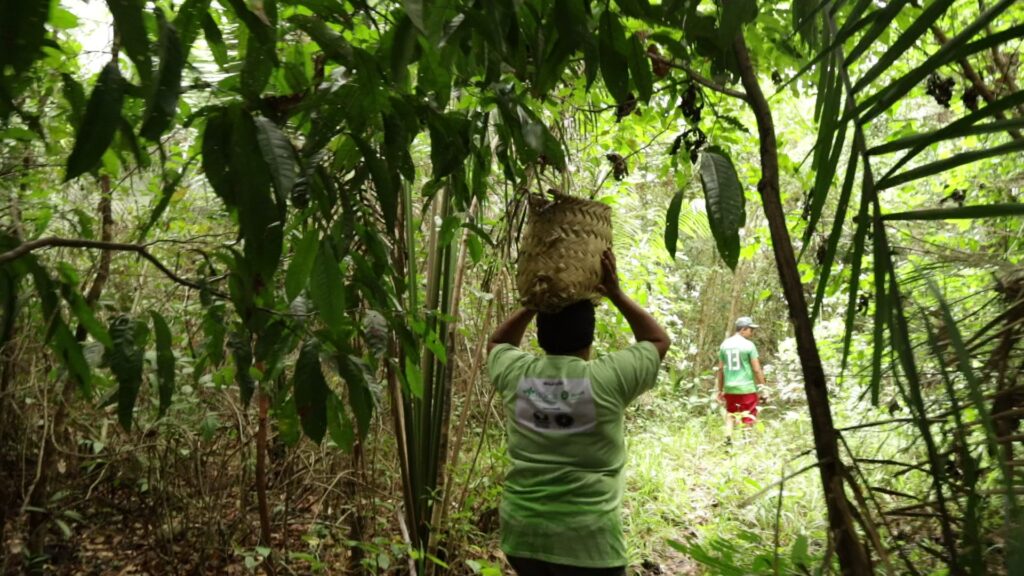
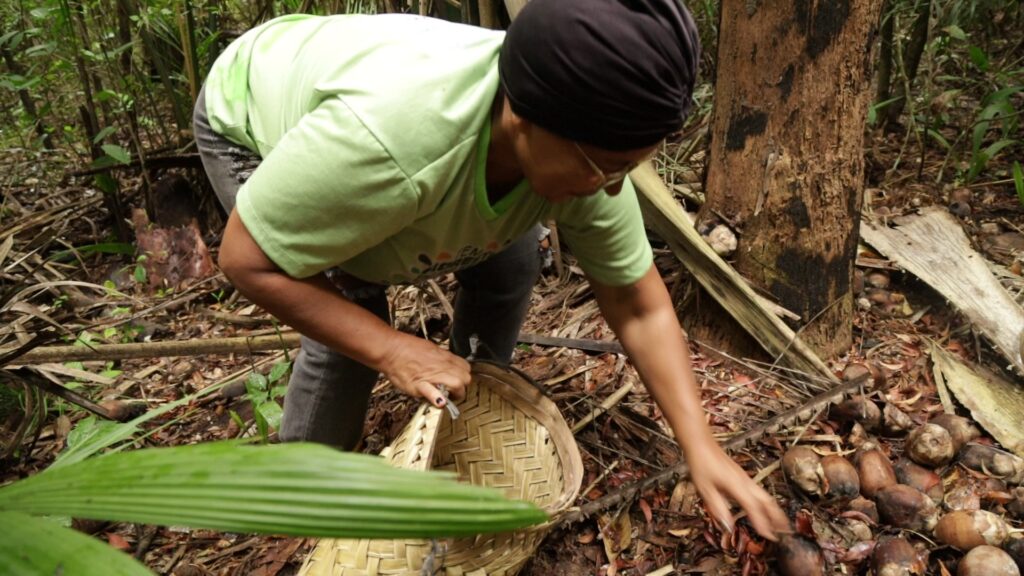
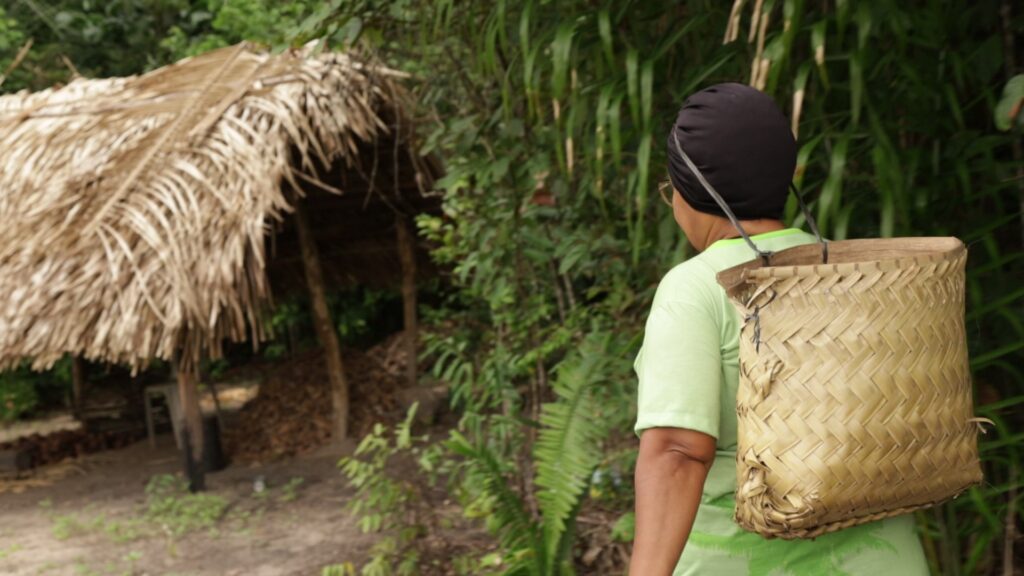
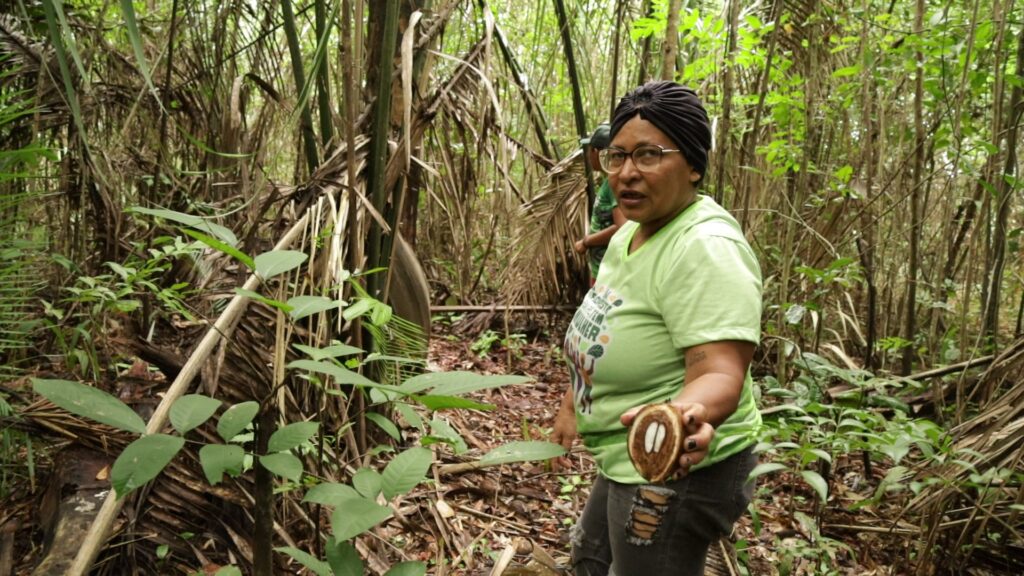
Being a babassu nutcracker shapes a cultural identity, a female awareness of ancestry that is tied to social and environmental mobilization. Mothers, grandmothers, and great-grandmothers engaged in these activities and fought for access to land.
“This knowledge is handed down from generation to generation. The MIQCB movement is a unique type of organization, because it expands their territorial acknowledgment rights while recognizing them as a community,” says anthropologist and researcher Cynthia Carvalho Martins, referring to these women nutcrackers.
This knowledge is handed down from generation to generation. The MIQCB movement is a unique type of organization, because it expands their territorial acknowledgment rights while recognizing them as a community.
Cynthia Carvalho Martins, nthropologist and researcher
This researcher highlights several significant changes in the Women Babassu Nutcracker Movement, reflecting on her own long-standing relationship with this initiative and how it evolved. She notes the expansion of its topics and fields of action, in parallel to fiercer conflicts and the rising importance of female protagonism and gender issues.
“This issue has expanded in terms of the Movement’s own sphere of action,” notes Cynthia Martins. ”That´s because its coordinators are women who are also babassu nutcrackers. This representativity encompasses babassu nutcrackers from different parts of Brazil, opening up possibilities of diverse demands and distinctive conflicts.”
Production Incentives
Inside the hut, a group of four elderly women place the nuts in a huge pan over a medium flame. Once toasted, they are sieved and sent for grinding. These women approach this entire production process with attitudes of care, love, and respect. ”This is where the oil comes from, which we sell through our cooperative or individually,” says Conceição Barbosa da Silva. Each holding 500 ml (just over a pint) of extra virgin babassu oil, these bottles display eye-catching labels featuring the MIQCB brand and a sketch of a turbaned woman with a bunch of babassu nuts. The sales price of about eight to ten liters (around two to three gallons) hovers around USD 12.00 (BRL 60.00).
However, realities vary among these States. The Piauí branch has four babassu pulp mills, with a monthly output of 600 kg (over 1,300 pounds) of flour. A plant in the Esperantina municipality produces extra virgin oil, while eight mini-plants in the Esperantina, Joca Marques, Madeiro, Luzilândia, and São João do Arraial municipalities have small-scale grinding and cooking structures. Supported by foundations, houses in these communities were repurposed as processing plants where groups of twelve women nutcrackers produce about 3,500 liters (925 gallons) of babassu nut oil each month.

They are also part of Brazil’s Federal Food Acquisition Program (PAA), which buys up large quantities of produce from family farms for allocation to Government-subsidized consumption hubs, such as school meals. In Piauí State, the Social Welfare Bureau buys produce that is then channeled to families living with food vulnerability.
However, the situation is different for women nutcrackers in Tocantins State. Getting into these programs has been difficult. ”Some of our products have been suspended. They claim they require certain licenses or seals that depend on other agencies, and the process gets tricky,” says MIQCB Coordinator Silvânia Nunes da Paixão, who is a member of the Olho D’Água community.
In São Miguel do Tocantins, a cooperation agreement with city hall supports the products and by-products of nutcracker activities. ”We are striving to include them in a rural development plan,” says Municipal Agriculture Secretary Mauro Fragoso.
Buyers of their produce – and the output of any community enterprise – contribute to forest preservation, buttressing the solidarity economy, and fueling the generation of jobs and income.
When not cracking babassu nuts for oils and other by-products, these rural workers are busy growing beans, maize, and bananas, while also raising chickens in their backyards. Some of their time is also spent on MIQCB administration. ”Between work and home, I have online meetings on all sorts of topics, like annual planning and institutional participation. My husband and I always share the chores, especially cooking, which I don’t like,” says Francisca with a smile.
This movement generated its own financing mechanism, avoiding dependence on third parties. The Babassu Fund was set up with Brazilian funding and international cooperation, strengthening the members of this Movement everywhere it operates. It began with backing from the Ford Foundation, then the Amazon Fund, and the Tenure Facility. This funding is intended to underwrite social, environmental, and advocacy projects implemented by women’s organizations.
Since its inception, the Babassu Fund has issued four public requests for proposals, providing capital for social, environmental projects implemented by women babassu nutcracker organizations and community groups. This fund is currently administered on participatory bases by the Babassu Fund Steering Committee (Comitê Gestor do Fundo Babaçu), which involves several partner organizations of the Movement.
These women nutcrackers are leaving their marks on babassu groves, social communities, and the world. ”Without our assertive stances and networking activities, all pursuing the same goal, we wouldn’t be where we are,” says Francisca one sunny afternoon as she leaves the MIQCB offices in Tocantins State, perched on the backseat of a motorcycle that kicks up dust on the streets of São Miguel.
This report is adapted from an article originally published in El País, a journalistic project supported by the Howard G. Buffett Fund for Women Journalists, International Women’s Media Foundation.
Project Team: Soledad Dominguez and Gabriele Roza


